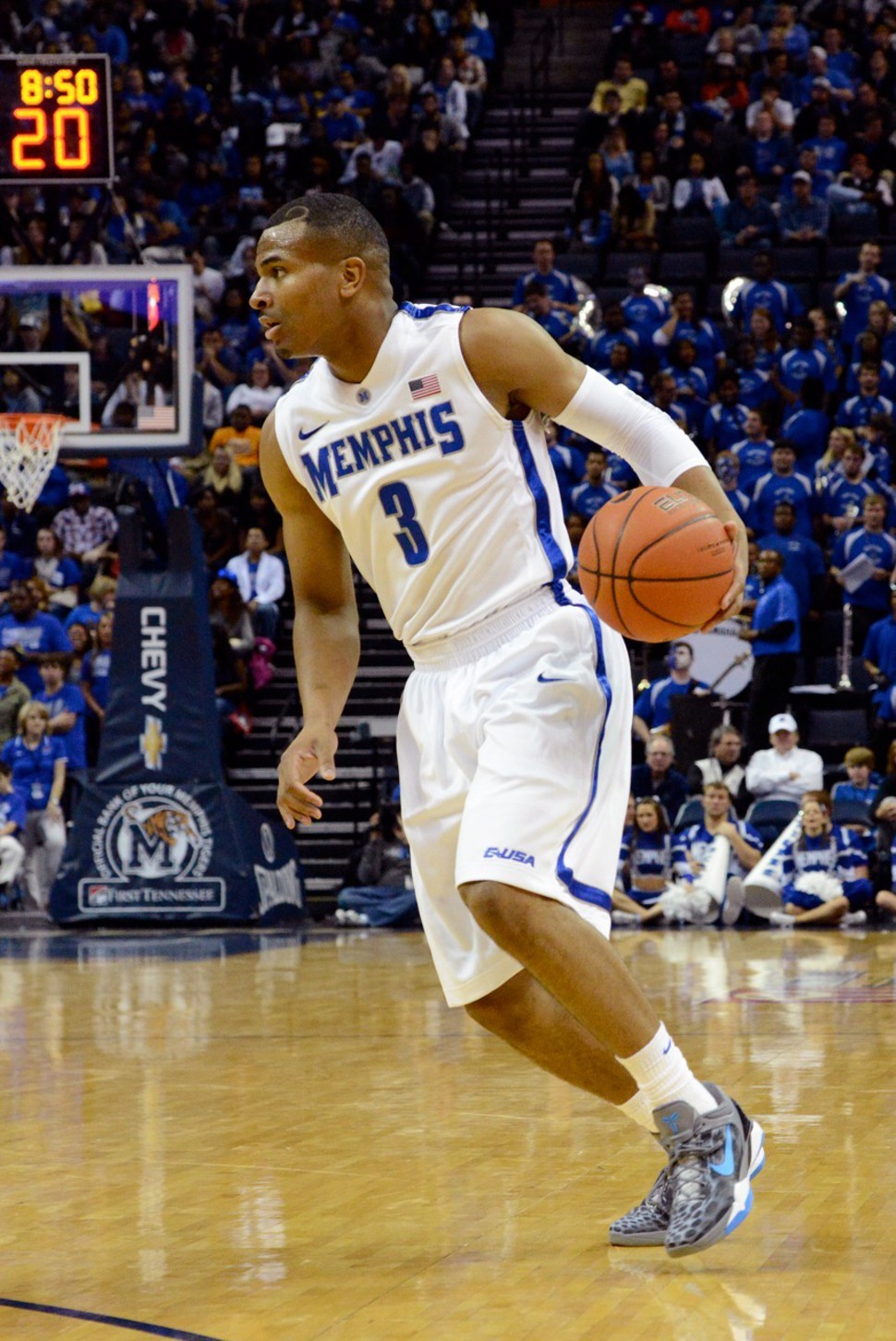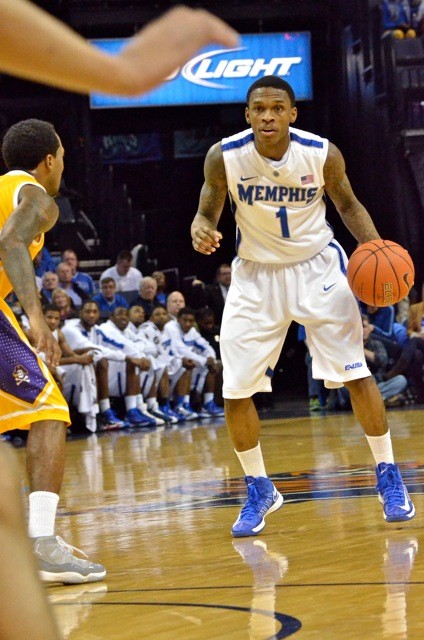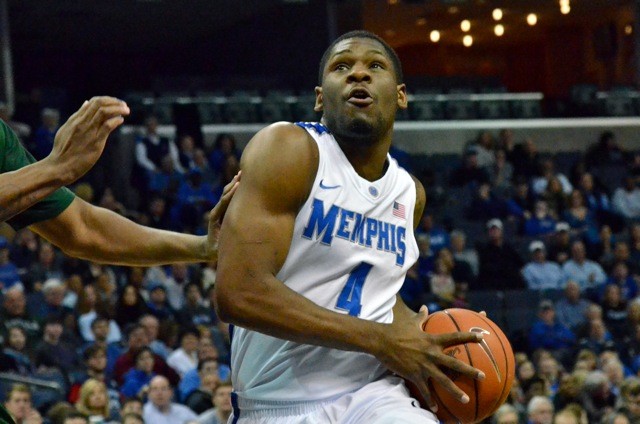With 15 games under their collective belt and 16 regular-season games to play, the Tigers find themselves at the season’s midpoint with as many questions to answer, really, as they had back in November. Can the team compete with Top 20 opposition? Is an NCAA tournament run a reasonable expectation? Who is the Memphis Tigers’ alpha male, the player to lift this team to heights unseen under coach Josh Pastner?
Instead of distributing the formulaic (A to F) midseason grades, I’m borrowing from hockey, and giving each member of the Tigers’ rotation a plus or minus, based on his performance this winter as compared with preseason expectations.
ANTONIO BARTON (-)
If any of these grades is unfair, it’s this one. For three seasons, now, Barton has had to establish what his role should be (or can be) as the season is unfolding. Arriving as a package deal with his older brother, Will, before the 2010-11 season, Antonio was initially seen as bonus value for the Tigers, a reserve who could handle the ball if Joe Jackson got in foul trouble, a reasonable shooter who could supplement a team led by more prominent offensive talents (like his older brother).
Barton has managed to retain virtually the same amount of playing time this season (21.0 minutes per game) as he enjoyed over his first two seasons (23.2), despite the emergence of Geron Johnson and the improved play of Jackson. His scoring (6.8) is slightly below his career average entering the season (7.4) but he leads the team in three-pointers made (19). So why the minus sign? Juniors need to take a stride or two up the developmental ladder, not merely hold steady. Barton won’t lose a game for the Tigers. How many can he win?
TARIK BLACK (-)
The Tigers’ lone preseason all-conference pick, Black would like to forget the first two months of the season even happened. A captain and longtime voice for reason and perspective in the Tiger locker room, Black had to sit out the UT-Martin game after an incident in practice, not the kind of thing that earns a captaincy. Nursing a groin injury, he has not started a game since the team returned from the Bahamas in late November.
Nonetheless, Black is third on the team in scoring (10.4) and has made 64.7 percent of his shots, after setting a team record (68.9) last season. Black’s rebounding is inconsistent (13 last Saturday night but an average of 5.5) and low for a player of his size and strength. If these Tigers are to, in fact, win a game or two in the NCAA tournament, Tarik Black will re-emerge and be a primary reason.
CHRIS CRAWFORD (-)
There comes a point in the career of any athlete when you are what your numbers say you are. This former Sheffield star is a 37.8-percent shooter, one whose cold stretches have been more pronounced than his hot streaks. (Crawford has endured one stretch this season in which he made three of 14 three-point attempts, another in which he missed all 13 over five games.)
Crawford is the prettiest passer on the team (second in assists to Jackson), and enjoys a lengthy leash (he’s second on the team with 28.4 minutes per game). Like Barton, though, you’d like to see a larger impact from a player who entered the season with 43 starts on his resume. Crawford may come to be the face of this mini-era: a good player, one easy to root for, but with shortcomings impossible to overcome.
SHAQ GOODWIN (+)
Armed with a refreshing smile (the best on the team in years), Goodwin has been strong (if not ferocious) in the paint for the Tigers. Playing almost 23 minutes a game, the freshman is second on the team in rebounding (5.5) and is efficient both from the field (52.7 percent) and the line (66.7). His scoring average (9.1) would be higher were this team’s offense not perimeter-based. (For every drive-and-scoop by Joe Jackson, there’s one less layup for Goodwin.) Similar to my thoughts on Black, if the Tigers are to do damage this March, Goodwin will have to make some headlines.
JOE JACKSON (+)
Certainly the most polarizing of the Tigers’ veteran players, Jackson has played lately like the kid who put White Station High School on his slim shoulders for four years. His performance against Tennessee earlier this month produced the kind of line (20 points, 7 assists, 4 steals, 2 turnovers) that leads highlight shows. Against a superior Louisville team, Jackson was guilty of eight turnovers but scored 23 points on just nine field-goal attempts and delivered eight assists.
Jackson has taken that “junior stride” we haven’t seen on the part of Barton or Crawford (or Black). He’s long played with a chip on his shoulder, knowing local expectations are all but impossible to meet. But there seems to be a focus to Jackson this season that has kept performance front and center and distractions (the chirping of friends and foes) to a minimum. We’ll call it maturity. It’s a welcome sight.
GERON JOHNSON (+)
The junior transfer is the best pure athlete on this team, and maybe the best to wear a Tiger uniform since Derrick Rose five years ago. It’s amazing how quickly concerns about Johnson’s off-court life faded when the strengths he brought his team became so abundantly clear. After sitting out the first three games of the season (for an academic violation at Garden City Community College), Johnson joined the Tiger rotation (playing 22 minutes against Minnesota in his debut) and has now started the last five games.
Johnson stole the spotlight against a good Ohio team in early December, hitting eight of 11 shots (including three treys) for 21 points. His line against Austin Peay: 14 points, 7 rebounds, 6 assists, 4 steals. Then against Tennessee — the Tigers’ first real road test this season — Johnson drained a pair of late three-pointers to fend off a Volunteer rally. His toughness (physical and otherwise) is invaluable.
D.J. STEPHENS (++)
It’s a shame there isn’t a statistic that measures applause. A player considered a possible redshirt before his senior(!) season has garnered more (and louder) cheers per minute played than all but a very few Memphis players over the last 30 years. Stephens’s practice time has been dramatically reduced by a shoulder separation suffered during the team’s three-game visit to the Bahamas in November. Which means he’s living Allen Iverson’s dream: show up on game night and bring the house down.
His astounding leaping ability would be a nice novelty act, and would draw its share of cheers. (Stephens leads the team with 31 blocked shots, second in C-USA.) But Stephens personifies the hard-to-define “energy” Pastner preaches for winning basketball. He pulled down 14 rebounds against Oral Roberts, then 11 more last week against East Carolina. He’s reached double-figures in scoring four times, and with the least god-given talent of any player in the Tiger rotation. Jumping high is one thing; applying it to basketball another. Give D.J. Stephens credit for applying the skills he has magnificently.
ADONIS THOMAS (-)
Averaging 11.0 points and 4.1 rebounds a game is nothing to sneeze at. But not on this team, and not if you’re auditioning for the NBA draft’s first round. One of two Tigers to start every game this season, Thomas has been adequate, as his numbers suggest. (We’ll ignore the atrocious three-point shooting: 7 for 37.) But Thomas was to be the face of this team, the guy who filled Will Barton’s vacuum and then some. The alpha male. The nadir of his season (let’s hope) came against Louisville, when Thomas took only six shots in 33 minutes (he made two).
Theories abound for why Thomas has disappointed. One eye on the NBA. Too much weight added last summer. Expectations too high for the McDonald’s All-American from Melrose. He remains the most gifted player on the Tiger roster. And there’s a lot of season left for Thomas to show the player he truly is (his mission statement entering the season after an injury-plagued freshman campaign). The trick will be elevating his level of play against the low-hanging fruit that is C-USA competition.
Photos by Larry Kuzniewski


